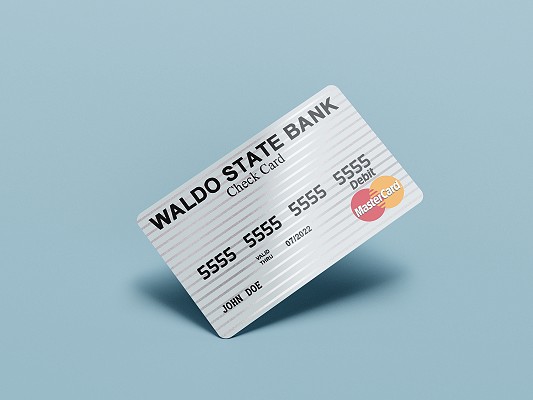Debit vs. Credit Cards: What’s the Best for Your Financial Situation?

As we continue to live in an increasingly digital era, paper money, coins, or checks are becoming more obsolete and less convenient. During COVID-times, where minimal contact with another person is a focus, most stores prefer debit and credit cards. But what is the difference?
Debit Card Facts
Debit cards are attached to personal checking or savings accounts. Often they require a PIN to withdraw the funds tied to the account to make purchases. Usually, there is a maximum amount you can withdraw from the account.
Debit cards offer the convenience of not needing to carry cash or checks. When money is required, you can withdraw from an automated teller machine (ATM). Even though there may be an extra charge to your account, it is handy.
Debit cards offer the flexibility of using it as a credit card with the ability to earn extra perks, like Waldo State Bank’s Scorecard Rewards Program, that include fuel discounts and rewards towards most anticipated products.
Since debit cards are linked to a personal account, you know the maximum amount you can spend. Funds directly taken from the designated account carry no consequence. Unless, of course, you run out of funds!
Credit Cards Facts
Credit cards, on the other hand, are tied to a loan. You have to apply to get a credit card to open a line of credit. The credit card vendor approves a specific amount on your line of credit based on your credit history. Interest rates and fees are also attached to credit card lines of credit.
While there’s flexibility in paying back the amount spent, only making the minimum payment every month can get you into trouble if you spend more than you pay back to the account.
Credit cards can also be tied to rewards like cashback bonuses or discounts on purchases if you sign up that day.
Pros and Cons
In the matter of speaking about financial responsibility, debit cards tend to be the best way to go. You have a set limit on how much you can spend per day and know that you have a limit on how much you can ultimately spend. However, if you need to make a big purchase, contact our financial experts, and your limit can be temporarily raised to accommodate your purchase.
Credit cards affect your credit score. If there are missed payments or the debt continues to increase, it can negatively impact your credit score. On the other hand, it can be a great way to build your credit when taken care of responsibly by making payments on time.
Both cards tend to have rewards programs connected to them that can benefit you as a patron. Rewards like discounts on gas purchases, discounts on hotel stays, travel opportunities, etc. are examples.
At Waldo State Bank, we offer both debit and credit cards for your purchasing convenience. You are automatically enrolled in our Scorecard Rewards program at Waldo State Bank when you sign up for a checking account. For every $2 spent on credit purchases, you earn 1 point towards special rewards.
Do you need guidance in choosing what is best for you or want to learn more about our Scorecard Rewards program? Contact us to speak to one of our trusted advisors.